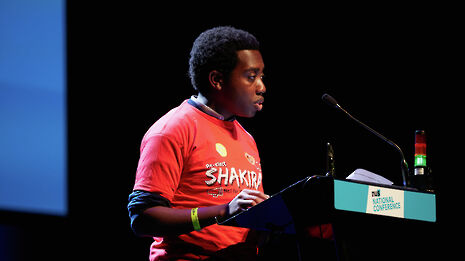Amatey Doku wins second term as NUS vice-president
The former CUSU president took a solid majority to fulfil the role for a second year

Amatey Doku, CUSU’s former president, has been re-elected as vice-president for higher education at the National Union of Students (NUS), defeating challenger Ana Oppenheim for the second time in a row.
Winning with a sizeable majority, Doku will continue in his role for another year, working alongside close ally Shakira Martin, who was also re-elected. Doku took 373 votes, with 156 delegates voting for Oppenheim and 24 to re-open nominations.
Ali Milani was re-elected as vice-president for union development, despite Doku and Martin’s faction supporting a rival candidate. Emily Chapman won her bid to be re-elected as vice-president for further education.
The election took place at the NUS’s annual conference, which is currently taking place in Glasgow. Student delegates from across the country, including six from Cambridge, have converged on the city this week to set policy and choose representatives for the national group. This year’s conference is strongly politically charged, marked in particular by an incident earlier today when delegates occupied the conference stage in protest.
We would like to congratulate Amatey Doku who has been re-elected as NUS Vice President (Higher Education) at National Conference 2018 #NUSConference https://t.co/WUzGmHiFSc pic.twitter.com/MWgOvWkkgF
- NUS UK (@nusuk) 28 March 2018
Doku received little support from Cambridge’s six delegates, with Miriam Gauntlett, Lola Olufemi and Angus Satow all backing Ana Oppenheim, and CUSU president Daisy Eyre voting to re-open nominations (RON) alongside Connor MacDonald. Carine Valarché is the only delegate who voted for Doku as first preference.
Eyre’s decision to RON is striking, given that she was Doku’s successor as both CUSU president and previously as Jesus College Student Union President – as well as being his ‘college daughter’.
Eyre said she chose Doku as her second-preference after RON, telling Varsity her decision came down to a disagreement with Doku over his approach to campaigning, which has been focused on lobbying.
“I think Amatey was a fantastic CUSU President, and really increased engagement in our SU,” she said. “This is why I voted Amatey as my second preference in this election. However, politically we differ in our approach to Higher Education; I feel that in our sector, engagement with government has limited potential and must be complemented with more grass-roots campaigning. So, I voted RON to make it clear that I am not content with the status quo.”
MacDonald told Varsity that he voted RON in opposition to Doku’s advocacy of a second EU referendum, a stance which was announced by Doku at this year’s conference.
“I was disappointed that Amatey decided to use such an important issue as an election gimmick”, he explained, noting that Doku only announced the policy in his speech, “not only is it a bad policy, but it is certainly not one (on either side) that should be used for crass politicking.”
Satow, who voted for Oppenheim, said: “Amatey has failed on his own terms in his unsuccessful attempt to get appointed to the government's pro-marketisation Office for Students. Cambridge students need a grassroots movement for free education, fair pensions and a more equal university. They won't find that in an increasingly inward-looking and bureaucratic NUS.”
Varsity has contacted Valarché, Olufemi, and Gauntlett for comment on the outcome.
Oppenheim, who Doku also defeated last year, conceded, tweeting: “I'll keep doing what I've been doing anyway”.
Huge thanks for everyone who supported my campaign. I'll keep doing what I've been doing anyway. Never forget that our strength is not in titles, positions or power lists but in collective organising. Let's keep fighting for HE for the many not the few. #NUSNC18 #NUSConference
- Ana Oppenheim🌹 (@AnaOpp) 28 March 2018
Doku, who studied HSPS (focusing on sociology) at Jesus College, won election to the NUS last year during his tenure as CUSU’s leader. As vice-president for higher education, he has focused on policies around Brexit and tackling the attainment gap for black students.
He and Martin were both controversially rejected for places on the board of the recently-established Office for Students, an appointment process which was recently criticised for taking “too partisan an approach to candidates’ views”.
Doku’s rival, Ana Oppenheim, was a member of the ‘left slate’, associated with the National Campaign Against Fees and Cuts, along with unsuccessful presidential challenger Sahaya James.
The run up to this year’s conference was marked by controversy around the re-elected president, who was placed under investigation by the NUS, following bullying allegations from several senior NUS members.
However, Martin and her allies have insisted that she is a victim of racism and classism, and that the accusations are simply electioneering on the part of the organisation’s left-wing faction.
 News / Colleges charge different rents for the same Castle Street accommodation2 March 2026
News / Colleges charge different rents for the same Castle Street accommodation2 March 2026 News / King’s hosts open iftar for Ramadan3 March 2026
News / King’s hosts open iftar for Ramadan3 March 2026 Theatre / Lunatics and leisure centres 4 March 2026
Theatre / Lunatics and leisure centres 4 March 2026 News / Angela Merkel among Cambridge honorary degree nominees27 February 2026
News / Angela Merkel among Cambridge honorary degree nominees27 February 2026 News / News in Brief: waterworks, wine woes, and workplace wins 1 March 2026
News / News in Brief: waterworks, wine woes, and workplace wins 1 March 2026









